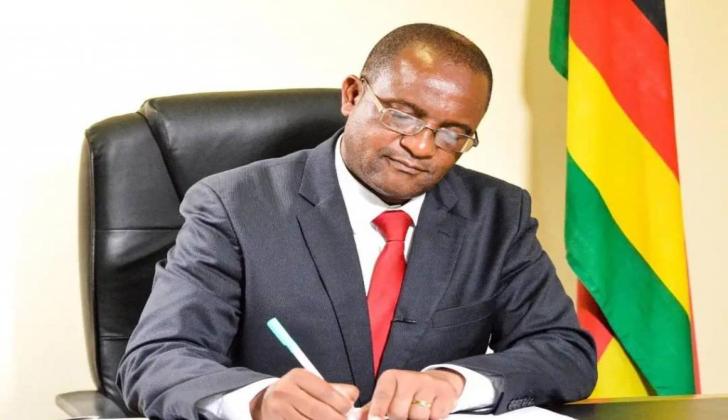News / National
'Mnangagwa's ED2030 a complete impossibility'
01 Dec 2024 at 12:43hrs |
0 Views

As Zimbabwe approaches the midpoint of President Emmerson Mnangagwa's second term, growing scepticism surrounds his Vision 2030 initiative and the increasingly controversial push to extend his presidency beyond the constitutional two-term limit set to expire in 2028.
The Vision 2030 agenda, which aims to transform Zimbabwe into an upper-middle-income economy by 2030, has been a cornerstone of Mnangagwa's leadership. However, critics argue that efforts to amend the constitution to allow Mnangagwa to remain in power beyond the mandated two terms undermine democratic principles and constitutional safeguards.
Prominent political figures, including lawyer and former Movement for Democratic Change (MDC) leader Douglas Mwonzora, have strongly opposed the proposal. Mwonzora, who led the MDC during its peak but has seen the party suffer a major electoral defeat in 2023, has dismissed the idea of amending the constitution for political gain. Speaking in Harare, Mwonzora referred to the campaign as a "mission impossible," warning that such an attempt would face significant legal and political resistance.
"The constitution is clear, and any move to change it simply to benefit one individual will face stiff opposition from both legal and political quarters," Mwonzora said. His remarks are part of a growing chorus of concerns from civil society and opposition groups, who argue that extending Mnangagwa's presidency would undermine the country's democratic process.
Under Zimbabwe's 2013 Constitution, a president is limited to two five-year terms. Mnangagwa, who assumed power in 2017 following a military-assisted transition, was re-elected in 2023 and is currently set to leave office at the end of his second term in 2028.
Supporters of the proposed extension argue that Mnangagwa's continued leadership is essential for realising Vision 2030, citing his policies on infrastructure development and economic reform. However, critics counter that this push for an extended presidency is less about economic progress and more about consolidating power.
Public opinion remains divided, with some praising Mnangagwa's leadership and the stability they believe he has brought since succeeding Robert Mugabe. However, many question whether extending his rule would be in the national interest, particularly given the country's ongoing economic challenges, corruption, and political instability.
The debate over constitutional amendments to extend Mnangagwa's presidency could further deepen political divisions in Zimbabwe. Analysts warn that such moves might erode investor confidence and harm the country's already fragile governance environment.
As the political landscape grows more contentious, opposition leaders like Mwonzora are vowing to resist any changes that threaten Zimbabwe's constitutional order. The outcome of this debate will likely shape Zimbabwe's political future, determining whether the country will remain committed to its constitutional framework or take a more authoritarian path under Mnangagwa's leadership.
With the 2028 deadline approaching, Zimbabwe's political climate is set to become even more charged as the debate over constitutional limits and the future of Vision 2030 unfolds. The nation waits to see whether Mnangagwa and his supporters will push forward with their controversial agenda or heed the growing opposition.
The Vision 2030 agenda, which aims to transform Zimbabwe into an upper-middle-income economy by 2030, has been a cornerstone of Mnangagwa's leadership. However, critics argue that efforts to amend the constitution to allow Mnangagwa to remain in power beyond the mandated two terms undermine democratic principles and constitutional safeguards.
Prominent political figures, including lawyer and former Movement for Democratic Change (MDC) leader Douglas Mwonzora, have strongly opposed the proposal. Mwonzora, who led the MDC during its peak but has seen the party suffer a major electoral defeat in 2023, has dismissed the idea of amending the constitution for political gain. Speaking in Harare, Mwonzora referred to the campaign as a "mission impossible," warning that such an attempt would face significant legal and political resistance.
"The constitution is clear, and any move to change it simply to benefit one individual will face stiff opposition from both legal and political quarters," Mwonzora said. His remarks are part of a growing chorus of concerns from civil society and opposition groups, who argue that extending Mnangagwa's presidency would undermine the country's democratic process.
Under Zimbabwe's 2013 Constitution, a president is limited to two five-year terms. Mnangagwa, who assumed power in 2017 following a military-assisted transition, was re-elected in 2023 and is currently set to leave office at the end of his second term in 2028.
Supporters of the proposed extension argue that Mnangagwa's continued leadership is essential for realising Vision 2030, citing his policies on infrastructure development and economic reform. However, critics counter that this push for an extended presidency is less about economic progress and more about consolidating power.
Public opinion remains divided, with some praising Mnangagwa's leadership and the stability they believe he has brought since succeeding Robert Mugabe. However, many question whether extending his rule would be in the national interest, particularly given the country's ongoing economic challenges, corruption, and political instability.
The debate over constitutional amendments to extend Mnangagwa's presidency could further deepen political divisions in Zimbabwe. Analysts warn that such moves might erode investor confidence and harm the country's already fragile governance environment.
As the political landscape grows more contentious, opposition leaders like Mwonzora are vowing to resist any changes that threaten Zimbabwe's constitutional order. The outcome of this debate will likely shape Zimbabwe's political future, determining whether the country will remain committed to its constitutional framework or take a more authoritarian path under Mnangagwa's leadership.
With the 2028 deadline approaching, Zimbabwe's political climate is set to become even more charged as the debate over constitutional limits and the future of Vision 2030 unfolds. The nation waits to see whether Mnangagwa and his supporters will push forward with their controversial agenda or heed the growing opposition.
Source - zimbabwemail
Join the discussion
Loading comments…
































